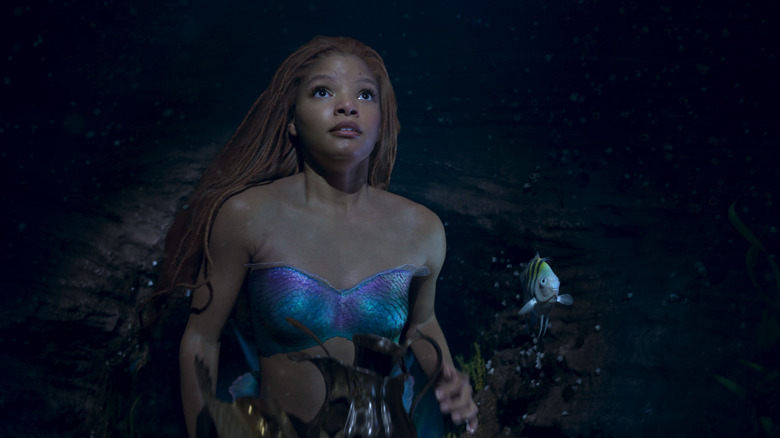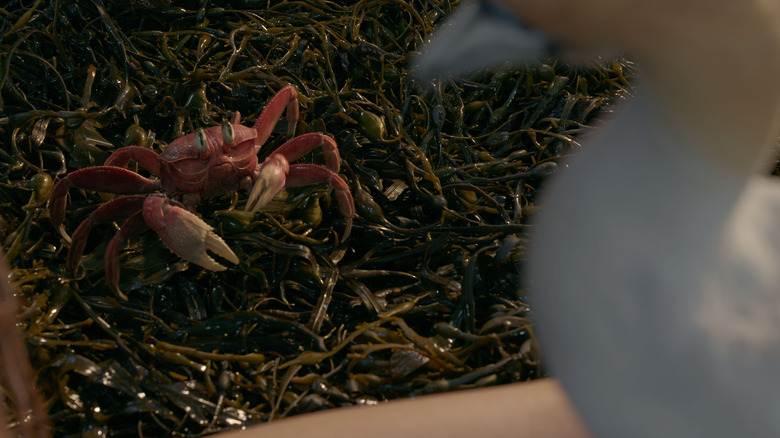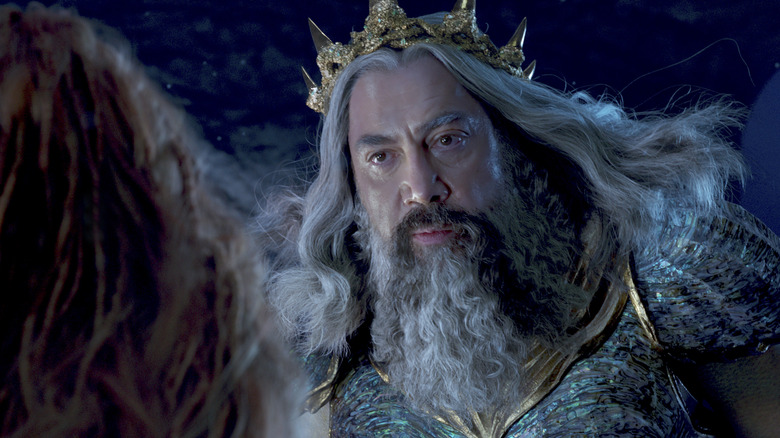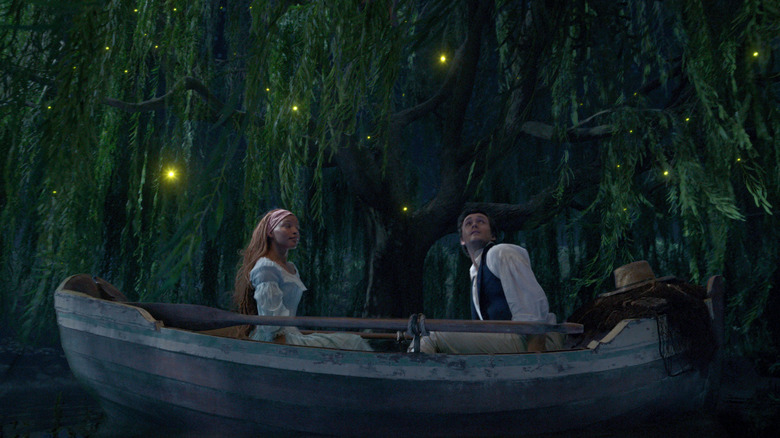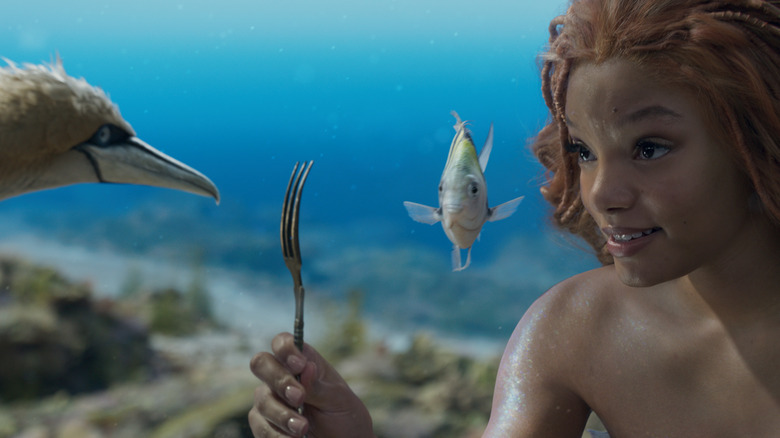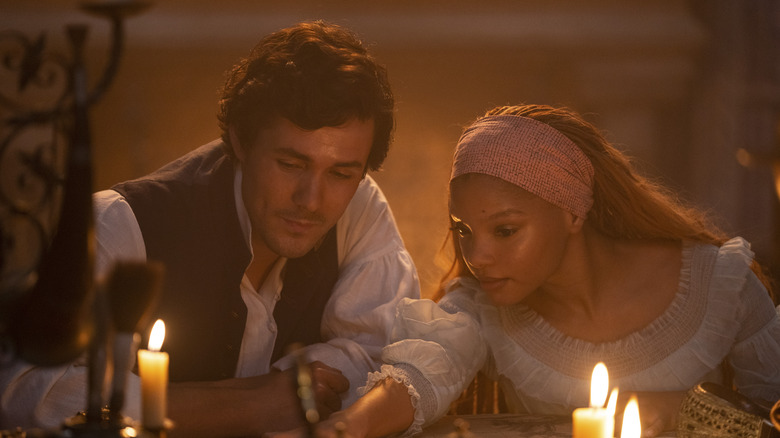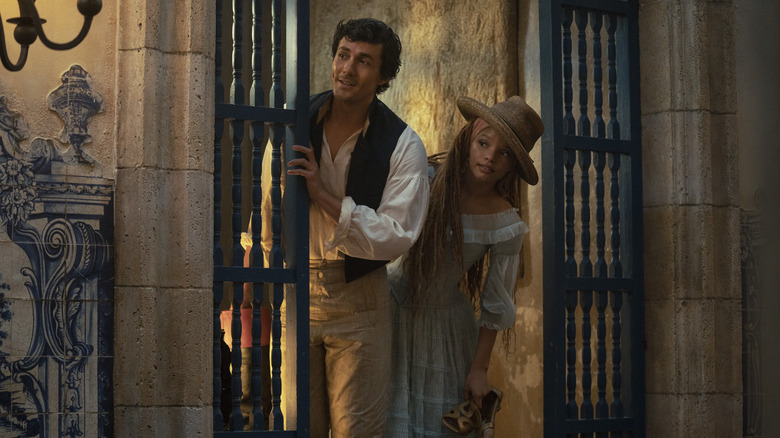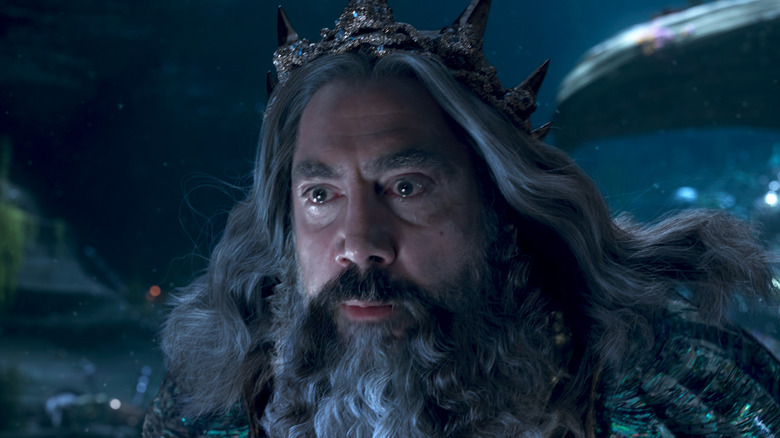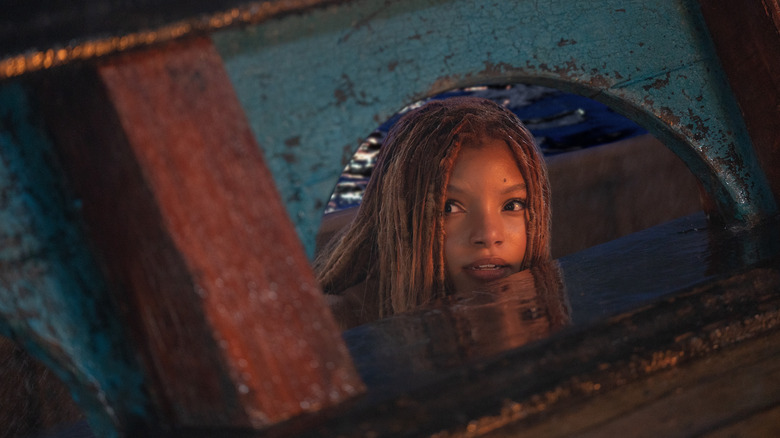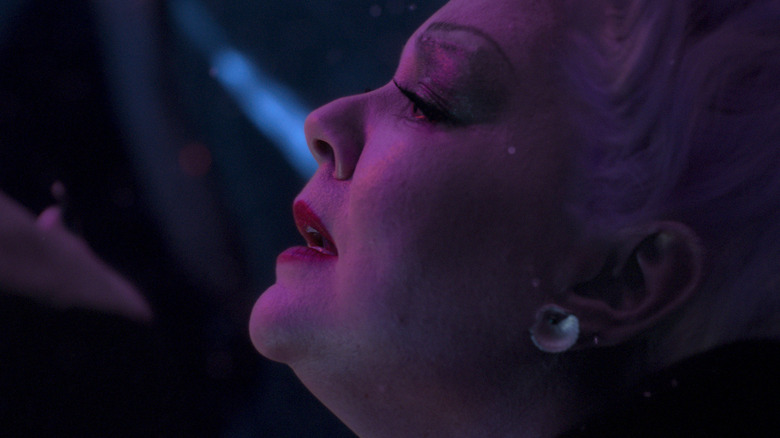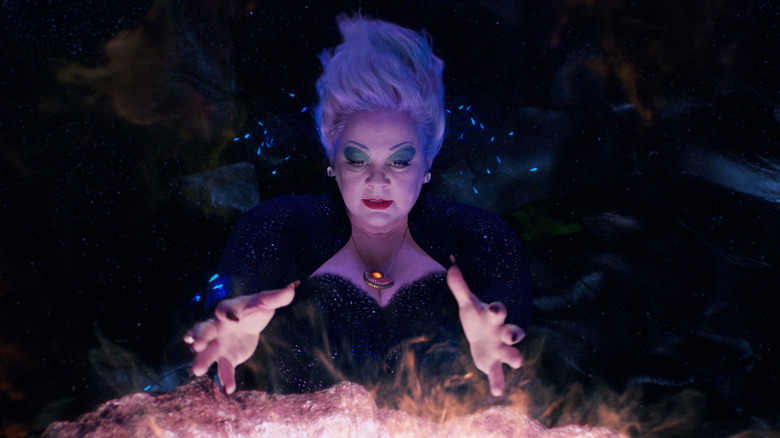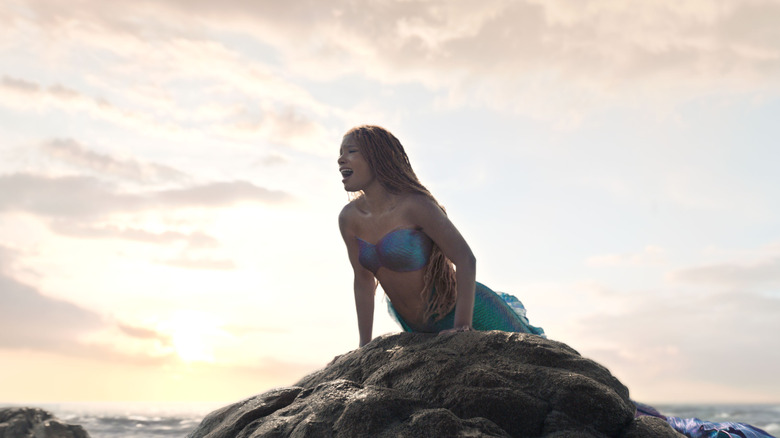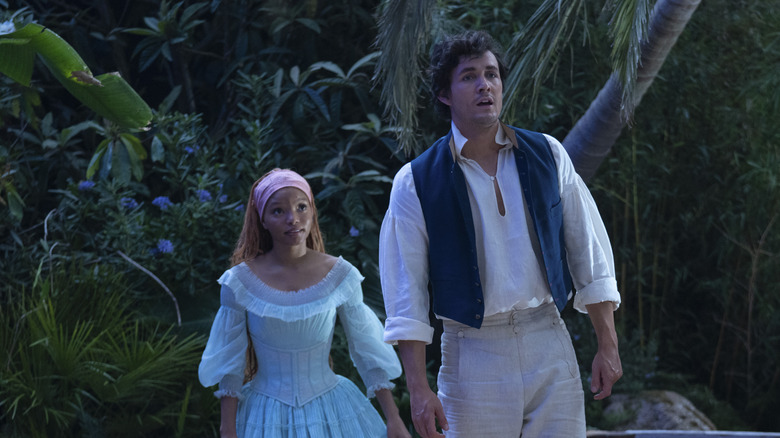Things Only Adults Notice In 2023's The Little Mermaid
Disney continues its trend of doing live-action remakes of its most beloved animated flicks, and now brings fans back under the sea for "The Little Mermaid." Like the 1989 animated classic, the film follows Ariel (Halle Bailey) — the ambitious daughter of King Triton (Javier Bardem) who yearns to explore the human world above that's forbidden to mermaids like her. Yet she falls for a human prince named Eric (Jonah Hauer-King) and turns to the nefarious sea-witch Ursula (Melissa McCarthy) to help her traverse the human world — a decision that comes at a grave cost.
It's been quite a long time since Disney's "The Little Mermaid" first hit theaters, and with this remake now bringing the story and its characters into a new light for modern moviegoers, adults who saw the original as kids might have a different perspective on the film. From new realizations about the themes of the story to noticing some bizarre aspects of the characters and plot logic, there are a lot of things that older fans can take away from seeing this remake. So, let's delve into all the things that adults might notice when watching 2023's "The Little Mermaid."
It's really creepy under the sea
One of the biggest criticisms of Disney's live-action remakes is how the once adorable animated non-human characters have been turned into strange-looking, overly realistic CGI creations, and "The Little Mermaid" has been a prime target of that criticism. When Sebastian (voiced by Daveed Diggs) and Flounder (voiced by Jacob Tremblay) were first revealed, there was definitely some backlash from fans stemming from their unappealing and unsettling redesigns. Frankly, Sebastian and Flounder are just a small part of how "The Little Mermaid" reminds older viewers how creepy it can be under the sea.
While the original animated film might've made the sea creatures seem all joyful and cute, not even the most upbeat songs can distract viewers from how chilling some of these sea creatures look. The entire sequence featuring "Under the Sea" has some of the most creepy-looking sea creatures you'll ever meet, and the spikier and more flowing they are, the eerier it is to watch them dance. The sea creatures of "The Little Mermaid" might've been adorable in cartoon form, but rendered this photorealistic they fit in better in a horror flick and act as reminder that sea life can be incredibly creepy.
Can't blame Triton
Triton's hatred of humans is complicated. Not only is a human responsible for killing Ariel's mother, but he and his daughters often have to clean up the shipwrecks that impact and destroy sea life. While it's easy to be on Ariel's side as a kid and be swept up in her rebellious nature, it's now tough to ignore where Triton is coming from. There's still so much human pollution and trash being dumped into the ocean causing sea life and water quality to face severe damage. If this terrible trend continues, the oceans will have irreversible damage that could lead to mass extinction.
So, Triton is far from overreacting about how humans cause damage to the home he loves, and it doesn't help either that we see humans actively trying to hunt mermaids. Ariel's innocent perspective and curiosity towards humans is undeniably admirable, but Triton's disdain for them is a strong reflection of reality and something that more adult viewers can more easily understand.
An environmental tale
There's a scene in which Ariel joins her sisters in cleaning up a shipwreck that's said to be destroying the coral, and it's here where Triton talks to them about the devastation that humans have caused to the ocean through their careless actions. While this scene could simply be seen as another moment of Triton dashing Ariel's dreams of visiting the surface and bonding with Eric, older viewers might perceive it as something more. Perhaps they could see it as one of the many ways that "The Little Mermaid" establishes itself as a tale about protecting the environment.
With the personal connection that audiences make with Ariel and her sea creature friends as well as the deeper focus on their perspective, it's easy to see how "The Little Mermaid" is a story that's meant to make people think more on our impact on the ocean. Even the ending sort of symbolizes the two worlds finally coming together and starting to find a deeper understanding of one another. There's much more to the themes of "The Little Mermaid' than just thinking more about the human impact on the environment, but it's something that'll weigh more on adult's minds as they leave the theater.
Magic water?
Given that Ariel comes from a powerful lineage of mermaids, it's not too surprising or out of the ordinary that she can talk directly with animals — mainly fish — or that there is magic in her world. However, there's something fishy about the film's depiction of life under the water that's tough not to notice. In an early scene with Scuttle (voiced by Awkwafina), she speaks to Ariel and Flounder while underwater without any real trouble. Scuttle isn't a sea creature so it's a little bizarre to see her be able to talk to Ariel underwater — let alone breathe.
There's also another moment in which Ariel interacts with a book during "A Part of Your World" and the book has somehow remained in pristine condition. Frankly, if that book was underwater for any serious amount of time it would be utterly destroyed and eventually unreadable, so the fact that it's stayed intact is baffling enough to make one wonder if the entire ocean is just made of magic. As a kid, maybe it would be easy to look past these oversights. But as an adult, it's hard to turn a blind eye and makes for some logic-defying moments.
Similar strife
For kids, it's easy to get swept up in the blossoming romance between Ariel and Eric and simply be pleased by how their love prevails. With this remake, though, older fans will find new appreciation for these two coming together as they actually deal with some similar issues. Both of them feel crushed by the expectations of their parents and their "destined" lineage and seek to explore new worlds and rediscover themselves through new experiences. Eric's passion for exploration and understanding is what initially draws Ariel to him, and it's what makes him fall for her as well since she shows an interest in exploring new countries with him.
Both Eric and Ariel struggle to have their voices be heard, but are able to listen to and love each other — which is why their ending together is so satisfying and meaningful. Ariel and Eric falling for each other is more than just the typical "prince and princess" falling in love that we've seen in other Disney stories. The similar strife they face in their lives is why they're drawn to each other and what makes them such a fitting pair — which is something that older viewers will definitely see more clearly now.
The timelessness of the tale
While the original animated film is already a beloved nostalgic tale, adult viewers will see how this remake showcases the timelessness of the story and the more relevant themes and ideas it represents. In essence, Eric and Ariel's personal arcs are about them achieving their desires to explore worlds and cultures outside of themselves and break down barriers that would keep them apart. Along with some of the environmental and self-discovery themes mentioned before, there are also some themes about understanding that are prevalent and incredibly relevant to the social discourse of today.
"The Little Mermaid" is definitely a strong reminder to adult viewers of the importance of being open to the world and trying to understand one another on a real level. Ariel and Eric's journey together and the impact of their true love is what genuinely breaks down the walls of conflict that have kept the human and sea worlds apart and that same perspective and ideology could easily translate to solving some of the divide we see amongst people today. It's not a cure-all solution, but the tale of "The Little Mermaid" still harnesses the power to inspire viewers to look outside themselves and explore the world with an open mind and heart — which is what makes it so perfect for adults to reexperience.
Triton's cluelessness
Triton is supposed to be an all-powerful force within the sea who controls the balance of everything that happens underwater and protects sea life at all costs. However, it's hard not to notice how clueless he can be about what's going on in his kingdom. Frankly, Ariel pretty much can do whatever she wants and stay nearly undetected by her father. Triton is left totally unaware of Ariel saving Eric from drowning or that she's built a hidden treasure trove filled with human artifacts.
It's tough to tell if Triton believes he's so powerful that no one would ever defy his rule or if he's just plain clueless. But if Sebastian hadn't spilled some of Ariel's secrets by accident, Triton would be totally in the dark about what's happening with her. He doesn't even realize that Ariel met up with Ursula and spent a few days in the human world. So it's unclear if it's simple arrogance or cluelessness, but Triton will definitely leave older viewers scratching their heads at how oblivious he can be.
Sebastian's a flip-flopper
When it comes to Sebastian the crab, many longtime fans will likely come to realize that he's kind of a total flip-flopper. Although he's pegged as Triton's loyal confidant in keeping Ariel in line, he doesn't exactly stay loyal to either Triton or Ariel. Sebastian tries to keep his word to Triton by persuading Ariel to stay with her father through "Under the Sea," but ultimately fails and ends up helping her try to kiss Eric to break Ursula's spell. He doesn't even try to tell Triton what's going on and essentially forgets what his mission is in the first place. Frankly, it feels more like he's just trying to get by in this wild and self-minded family of merpeople.
Sebastian always felt like he was kind of being dragged along in Ariel's adventure in the animated film, but here he feels like he's more than happy to be along for the ride. Fans will definitely still love Sebastian as a character, but will definitely take more note of his flip-flopping ways.
A poor choice
It's not too surprising to see that Ursula's plans to make Ariel fail to kiss Eric work, and that she's twisted the deal so that she now has Ariel under her control. This obviously upsets Triton and Ursula gives him an ultimatum — either have Ariel be tortured by vicious shocks from her loyal eels or give up his power to let her be free. He chooses to give up his power and while it's admirable, it's hard not to see it as kind of dumb. Sure, Triton is a father trying to protect his daughter in the moment, but you do kind of wonder why he just gives up so willingly.
He's clearly defeated and banished Ursula in the past and holds enough power to basically be a god, so it's a little strange that he doesn't try to at least fight Ursula. He doesn't even try to blast and kill the two eels who are shocking Ariel. Triton's decision to give up also only leads to his sudden death and Ursula rising to power — so it's really not a decision that benefits anyone on his side. As a kid, Triton's choice might not seem that misguided given the emotional aspects of it. For older viewers, though, you can't help but feel like he just needlessly causes more harm than good.
Not so invincible
Ursula has already shown herself to be a powerful witch, but basically becomes a tyrannical god when she obtains Triton's power. She literally rises out of the ocean to create a horrifying maelstrom that has the power to destroy nearly anything in its path. That is, until Ariel gains control of a ship and drives it into Ursula — stabbing her right in the gut. When you first see this scene in the animated classic as a kid, you're kind of just happy to see Ursula be defeated. Through an older lens, though, it's kind of baffling to see Ursula be defeated so easily given the immense power she possesses.
Seriously, Ursula has become a towering god who can cause unimaginable devastation and conjure deadly storms with the snap of her fingers. All that and she's completely destroyed by one small stab to the gut? It almost makes you wonder if Triton is just as vulnerable and the whole thing becomes more jarring the more you think about it. There is such a thing as suspending disbelief when it comes to movies, but Ursula's death really tests that concept.
Triton's daughters represent something more
As seen in the film, Ariel is only one of Triton's daughters, and she actually has six sisters. Each one resides in a different sea across the world, and while the original animated film made these sisters mostly into a singular chorus, this remake makes them more distinct by clearly showing that they each represent one of the Seven Seas. For instance, given the film's Caribbean-like setting and the cultural inspirations of the people, it makes sense that Ariel would represent the Caribbean Sea.
Ariel's other sisters also represent different parts of the world, and that's shown through some great visual storytelling. Each sister's distinctive color palette helps define where they hail from. It's actually a great reflection of the diversity of the world and an organic way to create more unique opportunities for representation within the film. The idea of the film acknowledging that Ariel and her sisters represent the Seven Seas not only gives older viewers a fun fact to tell all their friends, but also helps define the greater role their presence plays.
Parental woes
As a kid, it's incredibly fulfilling to see Ariel and Eric break away from their familial restrictions and start a new life together. As a parent, though, it definitely stings a little more knowing they're going to have that same moment with their own children. That final scene of Eric's kingdom and Triton's watching Ariel and Eric float away towards a new life certainly hits different for older viewers, and it definitely evokes some scary yet satisfying feelings of seeing your child go off into the world on their own. Like Triton, parents will be afraid of what the world has in store for their loved ones and fearful that they'll struggle on their own.
But also like Triton, parents will still feel hopeful for them and proud that their child has reached a fulfilling moment where they get to do things on their own and start their own adventure. It's kind of wild how adults will likely have more in common with Triton in this remake than they did watching the original, but that's what makes seeing these relatable parental woes so fulfilling.
